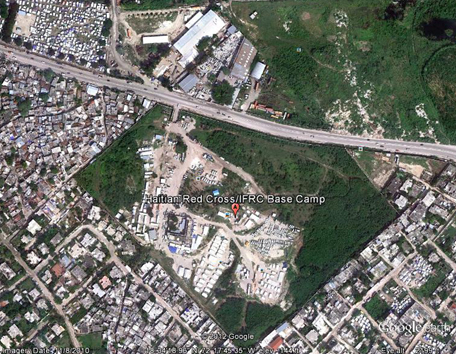March 27, 2012
A new report by AP investigative reporter Martha Mendoza and Haiti correspondent Trenton Daniel sheds light on the Red Cross’ plans to possibly build a hotel on the 10 acres of land near the Toussaint L’Ouverture airport that it uses for its base camp.
The article reports:
The International Federation of Red Cross and Red Crescent Societies is considering building a hotel and conference center in Haiti on part of a $10.5 million property that it bought after the 2010 earthquake.
The hope is that profits could sustain the work of Haiti’s local Red Cross in the coming years, the head of the international group’s Haitian delegation said Monday.
The 10-acre compound, known as the “Hilton Property,” was purchased from Comme Il Faut, Haiti’s local cigarette company, in the months after the quake, Eduard Tschan told The Associated Press in a telephone interview.
The charity paid in a single payment, using funds donated by national Red Cross agencies for quake recovery. At the time, Haiti’s recovery was the largest operation in the organization’s history, with 3,000 people working here.
Now that its work is winding down, the international Red Cross is putting together an exit strategy and as part of that process is trying to figure out what to do with this property.
The article goes on to describe some of the ideas that the Red Cross is apparently considering for the land:
It’s a valuable spot, near the international airport in a growing city. Tschan said two ideas are being studied: selling the acreage not being used by the Haitian Red Cross or finding a business partner and building a hotel and conference center that would provide profits to sustain the Haitian Red Cross.
“There is great potential with this property,” Tschan said.
He said that if a marketing feasibility study determines a hotel or conference center seems viable, the Red Cross will open the project to bidders.
“Ideally it would be a local company,” he said.
CharityWatch president Daniel Borochoff, who evaluates nonprofit organizations, said the hotel plan is risky and highly unusual. More typically, charities invest in low risk securities, he said.
“It’s not clear it would work,” he said. “And if they lose the money it’s going to be a problem.”
Borochoff said a hotel and conference center could tie up funds that might be needed quickly in future disasters, and noted donors hadn’t been informed.
“What would happen if donors learned that instead of giving money to treat cholera or build shelters, it’s going to build a hotel? I understand it’s an investment, but that takes some explaining,” he said.
AP goes on to note that other luxury hotels are already being built in the area.AP’s investigation raises several important questions. First, how much “acreage [is] not being used by the Haitian Red Cross”, and is there room for IDP’s there? A Google Earth look at the site suggests that there probably is a good deal of unused space:

Considering the hundreds of people who have recently been forcibly evicted – with some recently having been burned out of their camps in suspicious arsons – couldn’t this be space that the Red Cross could offer them, rather than using it for a commercial venture that might not even be viable?
The Red Cross’ post-quake spending and use of funds, as the largest NGO operating in Haiti, has been controversial almost since the beginning. News that some “funds donated by national Red Cross agencies for quake recovery” – much of which almost certainly came from individuals who believed their money would be used for emergency relief – might instead be used for a risky commercial venture (and one that caters to NGO’s and tourists) could provoke more controversy.
Earlier this year, the American Red Cross came under renewed scrutiny with the release of the film “Haiti: Where Did the Money Go?” which examines conditions in IDP camps and questions the American Red Cross, Catholic Relief Services, and other large NGO’s about their spending and activities in Haiti. The American Red Cross responded defensively, attacking the film and objecting to, among others, the assertion in the film that “The money was raised quickly and the clear implication is that it would be spent quickly.” In its response, the ARC stated
The American Red Cross repeatedly informed the public and donors in writing that its relief and recovery efforts in Haiti would last three to five years. …Our current program planning extends until December 2014, still in that window. Film@11 provides no evidence or basis for its claim that the American Red Cross implied that the money would be spent quickly. The key is to spend it wisely.
Plans to build a hotel might fit it into a similar planning window. Whether or not this would be money spent wisely – let alone used to best serve those most affected by Haiti’s recent crises of natural disasters and cholera epidemic – is another matter.






